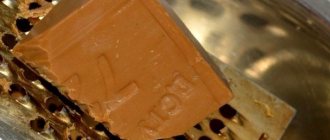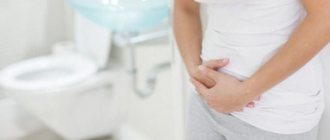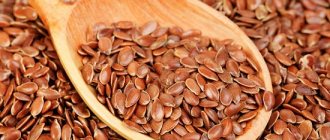Side effects
Activation of intestinal motility is accompanied by pronounced negative signs:
- abdominal pain;
- flatulence;
- spasms;
- diarrhea.
Allergic reactions occur less frequently. With prolonged use of decoction or dry extract of senna, colitis develops.
Contraindications
For certain diseases, the use of senna-based drugs is prohibited. Taking tablets or decoction in the presence of restrictions provokes an exacerbation of gastrointestinal pathologies.
Avoid herbal preparations with a pronounced laxative effect in the following cases:
- hemorrhoids, proctitis (exacerbation period);
- spastic constipation;
- metrorrhagia;
- perforated ulcer;
- acute inflammation of the abdominal organs;
- strangulated hernia;
- suspicion of appendicitis;
- hypersensitivity to laxative components;
- abdominal pain of unknown origin;
- disruption of the process of water-electrolytic metabolism;
- cystitis;
- gastrointestinal bleeding.
During pregnancy
Expectant mothers are strictly prohibited from using senna decoction/extract in tablets.
Spasms, flatulence, active laxative effects, frequent stomach pains with increased peristalsis of the large intestine can provoke premature termination of pregnancy.
Features of laxative action
How does senna act on the intestines? The mechanism of the laxative effect is due to irritation of the intestinal walls and stimulation of smooth muscles. With intense contractions of the intestines, liquefaction occurs and subsequent expulsion of feces occurs.
Senna flowers and leaves have high concentrations of beneficial microelements, which have a positive effect on the entire human body, including the digestive system as a whole. The main components of the plant are:
- Anthraglycosides and glycosides. The substance has a good tonic effect on the intestinal muscles. Glycosides actively stimulate intestinal motility and stabilize stool.
- Flavonoids. The substance has an antioxidant effect, increases body tone, and provides a mild diuretic effect. Flavonoids are necessary to fight cancer.
- Organic acids. The components in the plant normalize the intestinal microflora, prevent the development of pathogenic environments, and have a pronounced antibacterial effect.
- Alkaloids. The alkaloids contained in the plant have a powerful analgesic and sedative effect, which is useful for intense contraction of the intestinal walls.
Note! The laxative activity of the plant is due to the content of anthraglycosides. This component irritates the intestinal walls and stimulates smooth muscle contraction. The laxative effect and the first bowel movement usually occurs 7-10 hours after using the first portion.
Price
The cost of a natural product is minimal.
With treatment durations ranging from two to six weeks, acceptable cost is often the main criterion when purchasing a laxative.
Average price in Russia
In pharmacies in different regions, laxatives have a low cost:
- dry raw materials , weight 50 g, price - from 30 to 60 rubles;
- filter bags , weight 1.5 g, packaging holds 20–24 pieces, price – from 30 to 65 rubles.
Average cost in Ukraine
Pharmacy chains offer products from various pharmaceutical companies. Regardless of the manufacturer, the cost is available to any patient:
- senna leaf , cardboard pack, weight 100 g - from 8 to 14 hryvnia;
- filter bags , weight 2 g, quantity - 20 pieces, price from 10 to 12 hryvnia.
Combination with other products
You can cleanse the gastric tract not with pure hay, but with herbal-based drinks with the addition of healthy and pleasant-tasting ingredients. They will have an additional laxative effect and fill the body with vitamins and microelements. Will get rid of:
- chronic constipation;
- acne;
- insomnia;
- depression, bad mood;
- frequent diseases with viral infections, colds;
- prolonged fatigue.
Prunes, dried apricots, raisins in combination with hay and honey in recipes for cleansing the intestines will help eliminate slagging and prevent intoxication. There are many recommendations that include these components and have different effects on the intestines and internal systems.
Senna, holosas and raisins
The combination of natural components has a cleansing, protective and disinfecting effect. Raisins and holosas help cleanse the bile ducts and remove bile accumulated in them. Thanks to them, the effectiveness of cassia doubles, the intestines easily get rid of stagnant processes. The finished decoction completely cleanses of harmful substances and feces that have been in the body for a long period of time.
Cooking instructions:
- Pour a whole package of senna seeds and leaves into an enamel pan.
- Pour holosas in an amount of 300 ml.
- Steam with 1 liter of boiling water.
- Place 200 g of raisins in another container. It is advisable to use dried fruit from green and white grape varieties.
- Pour 1 liter of boiling water over the berries.
- Leave the mixture in both containers for two hours, then combine.
Take the prepared solution daily in the evenings. Single dose – 100 ml. The course lasts until the end of the prepared medicinal drink.
To normalize intestinal function, cleaning is carried out once every six months.
Senna, prunes and honey
If radical cleansing methods cause concern or are not suitable due to a busy work schedule, you can try a recipe for a mild laxative.
Cooking instructions:
- Prepare 100 g of dried apricots, prunes and raisins.
- Soak dried fruits in water for 2 hours.
- After the specified time has passed, drain the water and pass the dried fruits through a meat grinder.
- Add 100 ml of unrefined olive oil to the finished crushed mass.
- Pour melted honey in the amount of 100 g.
- Add 50 g of senna.
- Stir the mixture and store in the refrigerator.
Eat 1 tsp in the morning on an empty stomach. finished mass. Take courses for five days.
Senna and dried plum
The herbal combination helps improve digestion, improve motor skills, remove waste, heavy toxins, and other harmful substances from the intestines.
Cooking instructions:
- Pour 1 tsp into an enamel pan. herbs.
- Add prunes (2-3 pcs.).
- Pour 200 ml boiling water over the mixture.
- Bring the solution to a boil.
- Turn off the burner and leave to steep for 1 hour.
Take the finished product every morning on an empty stomach, 200 ml.
Plum goes well with cassia. Regular use of the infusion promotes gentle and painless cleansing of the intestines, gallbladder, and liver.
The drink is allowed for use by young children in cases of problems with the gastrointestinal tract. This is a tasty and healthy remedy for chronic constipation, which the child will drink with pleasure and continue to take until the problems are eliminated.
If flatulence, pain or other health problems occur, use of the mixture should be stopped. Children should be given herbal medicine only after consulting a pediatrician.
Analogs
Herbal preparations with a laxative effect:
- Agiolax. The drug contains plantain seeds plus senna.
- Senade, Kafiol. The active ingredient is senna.
- Laminaride. The active ingredient is seaweed (kelp).
- Musinum. Natural ingredients – anise plus buckthorn bark.
- Rectative. The basis of the drug is horse chestnut extract.
Many laxatives on the list are contraindicated during pregnancy. Before use, check the restrictions on use, side effects, and consult a gastroenterologist.
Contraindications and side effects
Given the powerful laxative effect, the use of senna leaves can affect the condition of the organs of the epigastric space and gastrointestinal tract. Contraindications to the use of medicinal herbs are:
- pregnancy and lactation (increased intestinal motility can stimulate the tone of the muscle structures of the uterus);
- symptoms of intestinal obstruction;
- tumor-like growths of the intestinal mucosa;
- exacerbation of hemorrhoidal disease;
- bleeding in the gastrointestinal tract of various origins;
- severe pain in the peritoneum of unknown nature;
- suspected inflammation of appendicitis;
- early postoperative period for interventions on the intestines, after cesarean section.
Important! Unpleasant sensations and side effects are possible if the daily dosage is exceeded. The main symptoms of side effects include spasms, increased gas formation, and flatulence.
The appearance of nausea or vomiting, abnormal bowel movements - all this indicates intolerance or overdose of the plant. At the first bowel movement, abdominal cramps are normal, but if the characteristic symptoms persist, stop taking the medicinal plant.
Video about the features and benefits of senna for the body:
Reviews
An inexpensive laxative is often used by patients of all ages for problems with bowel movements. Often leaves with an active laxative effect are used for accelerated weight loss. It is important to know when to stop, otherwise active loss of kilograms while simultaneously cleansing the intestines will cause problems with the gastrointestinal tract and provoke dehydration of the body.
Reviews about the natural laxative are often positive. Patients note the high effectiveness of preparations based on senna, leaves, tablets and filter bags . Side effects in the form of flatulence and abdominal pain are less important than the active effect of a natural laxative.
Laxative senna: side effects
Basic recipes based on senna
How to take senna herb for constipation correctly? The plant can be used in the form of decoctions and infusions for internal use. Senna is sold from pharmacy chains in the form of preparations, a pure composition of dry leaves and tablets. The most effective is dried grass.
Senna based infusion
To prepare the infusion, you will need to pour 1 teaspoon of the plant into 300 ml of water and leave for 24 hours. The water should be at room temperature, and the composition should be stirred during the infusion period.
After infusion, the composition is filtered and taken 250 ml at night before bed. In pediatric practice, this infusion is used in accordance with the following dosage:
- children over 7 years old - 150 ml;
- children under 7 years old - 50 ml.
Senna leaves should not be taken by infants and children under 3 years of age. The infusion retains all useful microelements, which has a beneficial effect on the internal microflora of the stomach and intestines.
Herbal decoction
For severe and prolonged constipation, it is recommended to prepare a decoction based on senna leaves. Before brewing the decoction, you should choose a heat-resistant glass container.
To do this you need to pour 2 tbsp. spoons of the plant 0.5 liters of boiling water and bring to low heat for about half an hour. Next, cool the broth slightly, filter and drink 250 ml twice a day. In this case, the first dose should be after 16.00, and the second before bedtime. Usually the first bowel movement occurs in the morning.
When treating constipation in children and the elderly, it is important to determine the dosage in accordance with the clinical picture and the nature of constipation. High dosages may cause severe bowel problems with painful bowel movements.
Powder based on senna and licorice
This complex laxative is used for hemorrhoidal disease. The complex powder contains crushed senna leaves, licorice root, dill seeds, purified sulfur and a little sugar. 1 tbsp. A spoonful of powder is diluted with water and taken in the morning on an empty stomach, washed down with plenty of warm water.
Article on the topic: Why there is girdling pain in the stomach area
Senna with prunes
Senna leaves can be combined with other ingredients. Senna and prunes are effective laxatives. So, 2 tbsp. spoons of senna are added to prunes (0.5 kg) minced in a meat grinder, combined with vegetable oil and honey. This composition is consumed in the morning on an empty stomach and 1 tbsp at night. spoon. The first bowel movement after consumption occurs within a few hours.
Note! The benefits and harms of senna are due to its laxative effect. On the one hand, there is a natural stimulation of the smooth muscles of the intestines and the expulsion of feces out. On the other hand, enemas and exercises have a powerful laxative effect that can be harmful in the presence of various diseases of the digestive system, symptoms of intestinal obstruction, and exacerbations of inflammatory diseases of the gastrointestinal tract.
You can learn more about the treatment of constipation using alternative medicine methods in the article “Folk remedies for constipation: rules of choice, recipes and other clinical nuances.”











